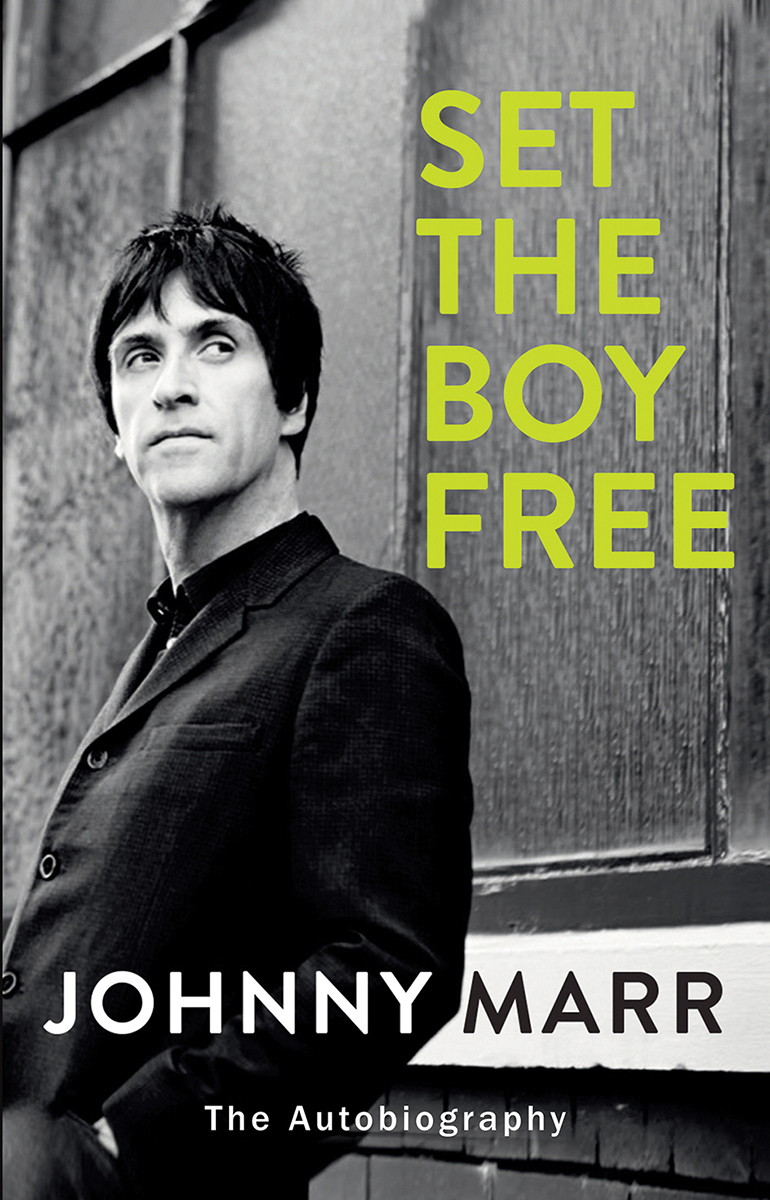Interview: Johnny Marr – The melodic genius speaks to G&B
The melodic genius at the heart of The Smiths turned prolific collaborator and celebrated solo artist, Johnny Marr has a few stories to tell.

It’s one of the most remarkable facts in guitar music history that Johnny Marr was just 23 when The Smiths split up; he had already achieved more than most musicians do in a lifetime. Since the seismic day in 1987 when Marr and Morrissey went their separate ways, Marr’s added many more career highlights – taking on guitar duties in Talking Heads, The Pretenders, The The, Electronic, Pet Shop Boys, Modest Mouse and The Cribs, plus releasing a pair of solo albums.
Yet, despite all those musical landmarks, when Marr, now 53, sat down to write his new autobiography Set The Boy Free, the release of his Fender Johnny Marr Jaguar series of signature models stood shoulder to shoulder with dizzying highs such as the era-defining albums The Smiths made, their unforgettable gigs and that iconic Top Of The Pops appearance. Johnny Marr lives and breathes guitars.
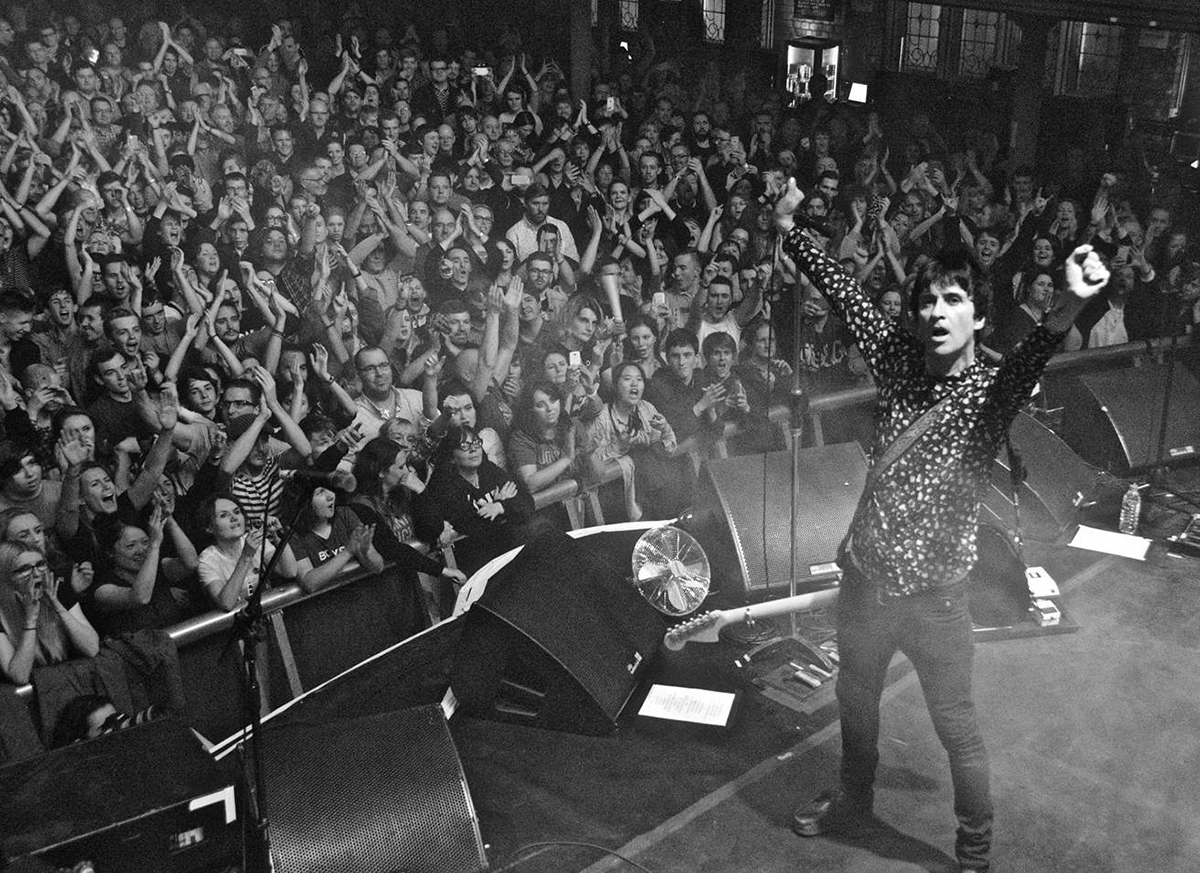
Marr in celebratory form at Manchester’s Albert Hall in 2015
“Having my own guitar with Fender is one of the things I’m most proud of,” Marr tells G&B. “I’d put it up there with the top three things in my career that I’m most proud of, without a doubt. It might even be the thing I’m most proud of in my career.
“It does blow my mind actually. It’s a key point in the book, how me discovering the guitar came about [Set The Boy Free opens with a chapter on how a five-year-old Marr was entranced by seeing a toy guitar in a local shop called Emily’s]. It’s a constant from my life as a little boy who was only five, and that’s amazing.
“When I got the first one off the production line in 2012, I took it the next night to play with Chic for the first time. Then I used it on the Inception soundtrack. But my son Nile happened to be in London, so he picked it up for me first. On the way back to giving it to me, he got up at The Forum and used it to play that night with Broken Social Scene. So he played with it before I even got to lay my hands on it, the fucker. But there’s something nice about passing it on to a new generation.
“That guitar does have music in it. I used it a lot with the orchestra when I was doing the soundtrack with Hans Zimmer, and I also used it on Spider-Man. But the amazing thing is every one of those guitars is the same. I have to give Fender the credit for that.
“The absolute main criteria for me doing a guitar with Fender is that anyone can go into the shop and come out with one that’s exactly the same as the guitar I play. That had to be the case.”
Marr writes in the book about his belief that certain guitars have music already stored in them. In 2000, his beloved Gibson SG was stolen from the stage at London Scala after a gig with the indie band Haven. It was returned to him 10 years later by a fan who was a policeman and took it upon himself to track the guitar down.
We ask Marr whether any of the intangible musicality remained in the SG when he was reunited with it. “It absolutely did,” he replies. “That’s a good question. Amazingly, it felt exactly the same as when I’d left it, although the fucker had broken it and had it repaired. But, that aside, that guitar is such a tough little fucker it still felt the way it did when I last played it, regardless of the break.
I guess that I got lucky that the prick who stole it off the stage wasn’t a musician. But, now I think of it, it doesn’t come as a surprise that such a prick would be a musician.”
Returning to that oft-quoted fact about Marr’s tender age when the band went their separate ways amid acrimonious circumstances, Marr says that when writing Set The Boy Free, he found himself stunned by the amount he achieved so young. Now 53, he says: “The most revealing aspect of writing the book was just how young I was when things happened. At the age I am now, it’s striking looking back how young I was, especially where The Smiths are concerned. And my teenage years – I did a lot even before The Smiths.”
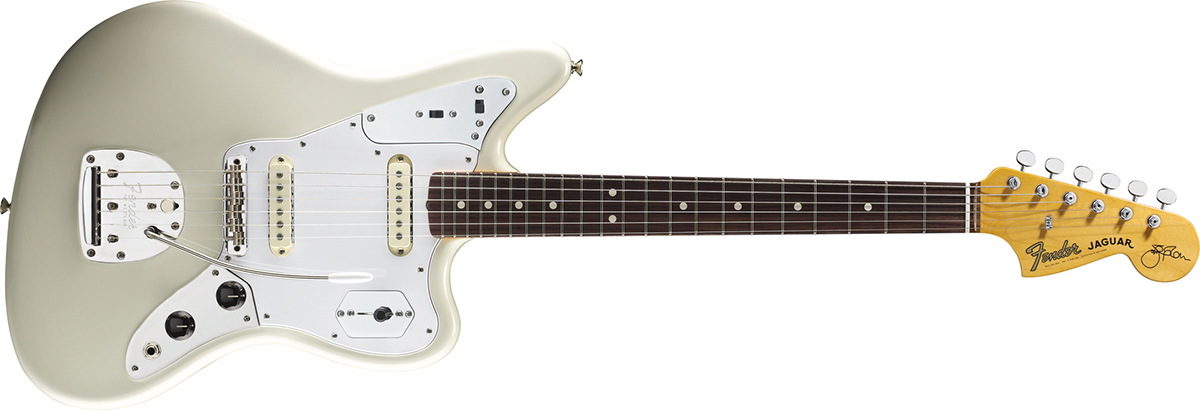
That it’s taken so long for Marr to commit his memories to paper is understandable when we recall that he’s always described himself as being ‘anti-nostalgia’.
“Doing the book was now or never,” he admits. “I made a pact with myself when I was younger that I was never going to be about nostalgia or reflection. Which is a drawback when you’re writing your autobiography! But the book has an energy, and it doesn’t feel too reflective. That’s one reason for the title – Set The Boy Free has that feeling of wanting to bust free and get more out of life. Plus, it sounds like the title for a great pop song that I haven’t heard yet…”
Fittingly for a man who’s famed for being so musically prolific, Marr wrote the book in just nine months, choosing not to enlist a ghost author – partly as a challenge to improve his own writing. “Doing my autobiography with someone else seemed like a contradiction in terms,” he explains.
“I don’t have a problem with ghost writers. But the application, the accuracy, my style and actually writing it? That all goes out the window with a ghost writer, I think.”
Marr is one of the most gregarious and open figures in guitar music, an interviewer’s dream, and he’s keen to assert that settling scores with other members of The Smiths was not the motivation for the book – because there were none to settle. “Almost from when it was first announced that I was writing my autobiography, I’ve had people in the media making assumptions about settling scores,” he says. “But I don’t feel I have scores to settle, and it’s not my style anyway. I’ve no intention of rewriting history to settle some scores.
“The fact is, when the band were together – certainly for me – The Smiths was nearly always joyous and an amazing trip. You can hear that in the music, as you can when drama and neurosis came into it. That was all part of what we were.
“Anyone who was in the band or around the band who denies that joy is rewriting history, because we were always walking three feet off the ground when we were doing things. I’m glad that I’m able to put that love back into the band, because things have got out of balance. The Smiths have been short-changed, especially by past books by supposed authorities like Johnny Rogan. But that happiness is the truth.”
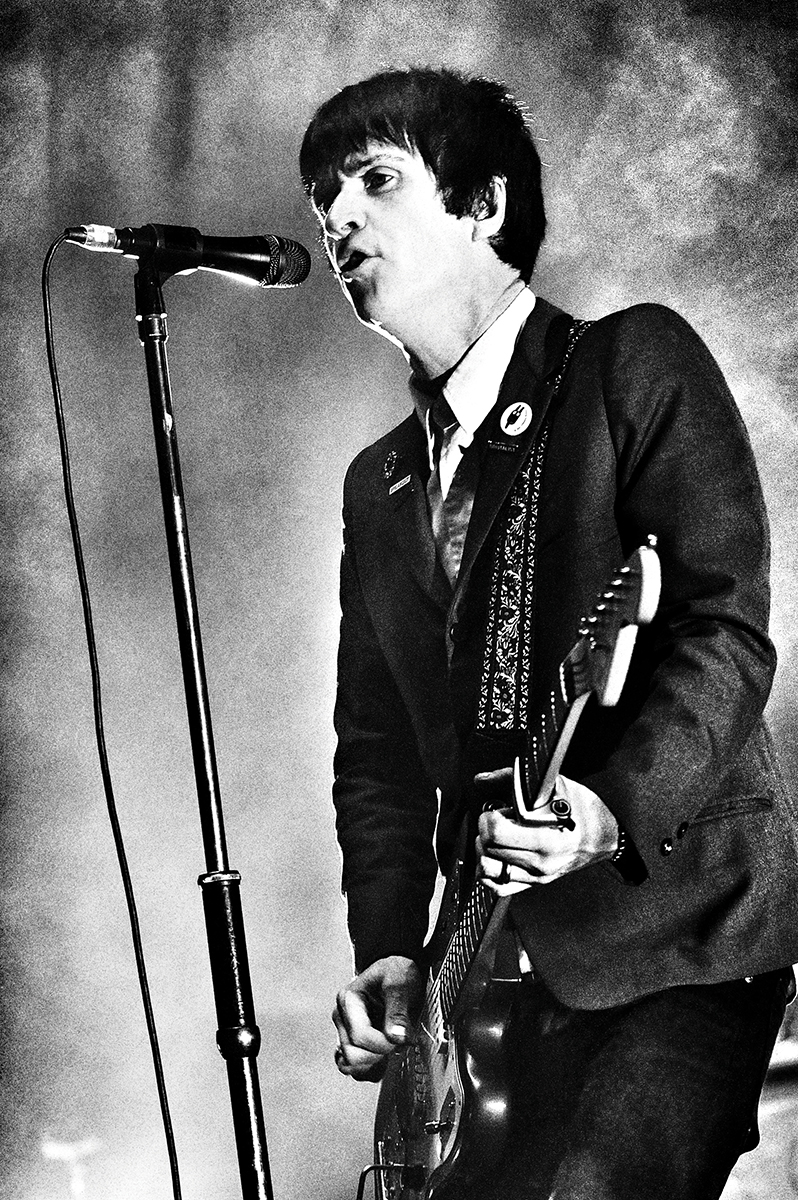
“I did know I was in the best band in the world, yeah,” Marr laughs when we suggest to him that The Smiths were beyond compare. “I liked lots of other bands, but The Smiths were above and beyond anyone. We played the best gigs and put out amazing records, and I felt like we were keeping our wheels going all the time. We never coasted.
“Put it this way – I never thought The Smiths needed to be better. Every time I sat down to write a song, I was really trying to do something special. You can’t always do that, but we did a pretty good job of it. And I’m really proud of that.”
Set The Boy Free details the one subject with which many fans of the band remain obsessed – the possibility of a Smiths reunion. After the aborted attempts to reform in 2008, Marr’s main contact with Morrissey was when the guitarist emailed the singer a photo of a student wearing a Smiths T-shirt protesting against rising tuition fees in 2010.
After a brief email exchange, Marr writes that there was “disaffection and distrust” lingering between him and Morrissey. But he believes their friendship can still be resumed. “Yeah, it will be resolved,” he reflects.
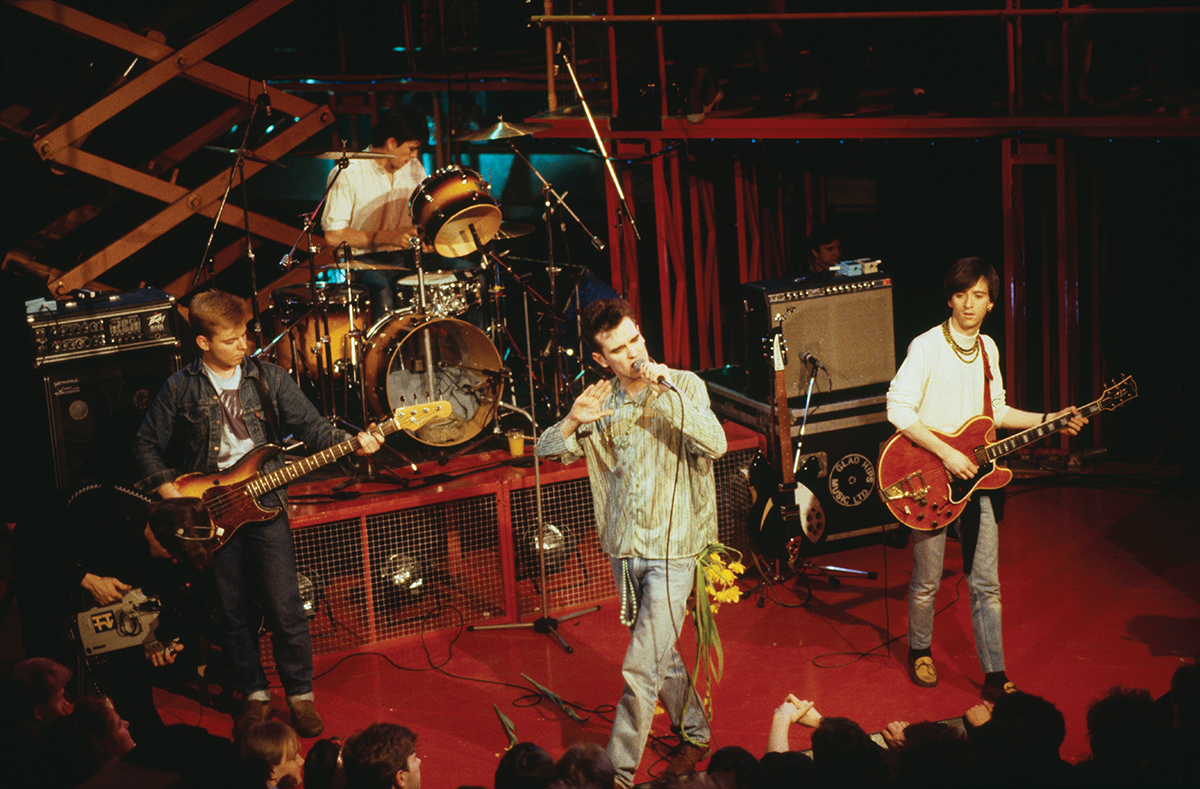
On stage with The Smiths in 1984
“I think it’s all fine. I don’t have any distrust or disaffection for Morrissey. And if it ever appears to be that way in public, that’s just posturing. I can only speak for myself by saying that.
“When I was writing about our relationship in the book, I didn’t overthink it. Anyone who needs to know how I think about things gets the reality of it from reading the book. It’s obvious how I am about me and Morrissey: I’m pretty open-minded, I’m pretty laid back and I don’t give a fuck what other people outside of The Smiths think.”
Shortly after the split, Marr met Paul McCartney, perhaps hoping for some sage words of wisdom about the band’s demise. The proffered advice was simple: “That’s bands for you”. It’s a phrase that’s stuck with Marr. “Paul McCartney is more than qualified to have come up with that little four-word phrase, and it does say a lot,” he chuckles. “Because bands are invested with so much emotion, ambition and idealism – or they should be. When those things are compromised or split apart through fame, drugs, wealth, success or lack of success, it’s an experience unique to everyone who goes through them.
“It’s complicated, because often the dysfunction of a band’s chemistry is what makes the music interesting. Some bands find an equilibrium with their chemistry – U2, for example – but sometimes the tensions and the story off-stage are what make the chemistry interesting. It’s unlike anything else in art. You don’t paint a canvas with four other people and you don’t get on a bus together to promote it either.”
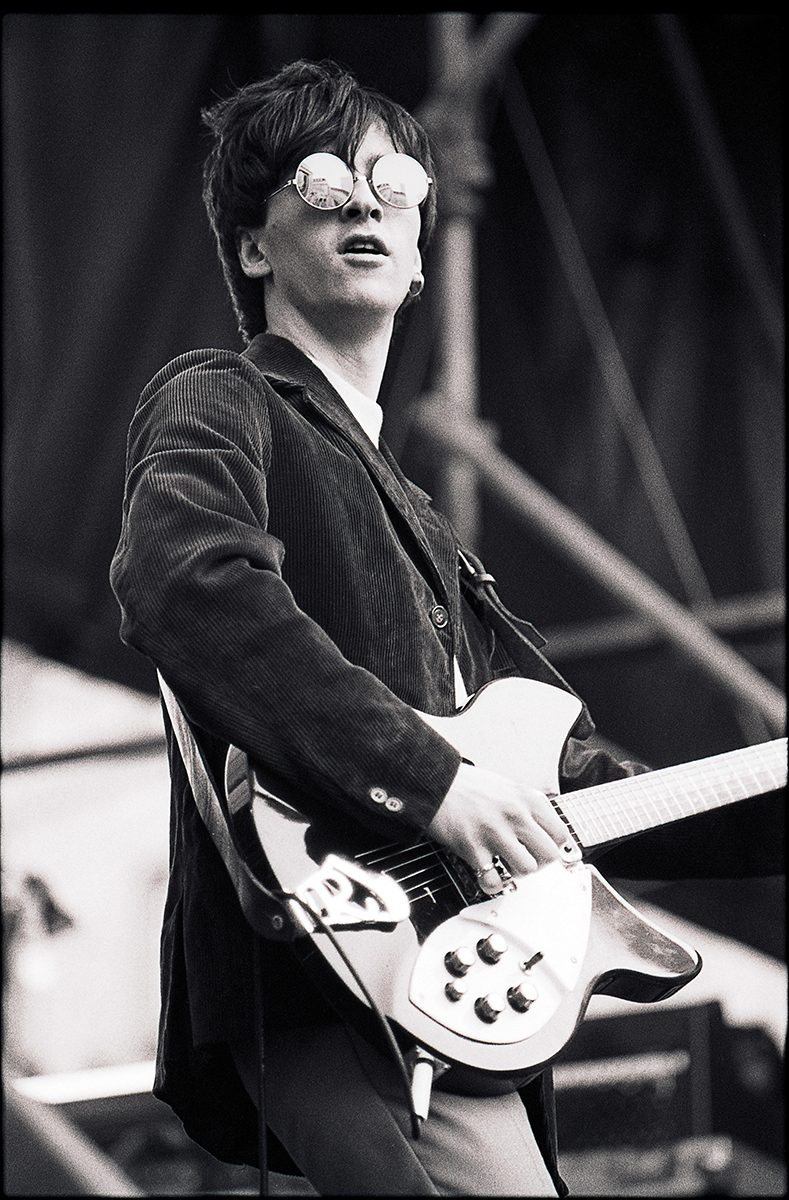
Marr’s wife, Angie, believes his best guitar playing came during sessions with Bert Jansch, but Marr reveals that no recordings exist. “I’m really alright with that, as I can remember what we were playing,” he says.
“I wrote an instrumental song, A To Z, which Bert helped me out on, which was a really interesting, acoustic expedition. I’ve always been able to remember it, which is nice with him not being around now. I recorded a couple of things on his album Crimson Moon, which were nice, but the music I talk about in the book was jamming intensely on these really out-there improvisations, which covered psych and folk to getting pretty jazzy.
It was very psychedelic. Bert was a very psychedelic person, and those recordings don’t exist. Yeah, that was the best guitar playing I’ve ever done. Angie says so, and she should know.”
After writing about his teenage years and meeting Angie, the next part of Set The Boy Free that Marr penned covers tales of hanging out with Bernard Sumner in Electronic “because they were the most fun”. Their three albums spanned the 90s, but Marr says he knew it was all over when the duo began making final album Twisted Tenderness. “As Bernard’s friend, I could see New Order needed to resume,” he says. “I needed to do something else and get back to touring, which Electronic didn’t really do. But Twisted Tenderness benefitted from being made very, very quickly. There are a few songs – Haze, Vivid and Late At Night – which profit from the sense of a last hurrah.”
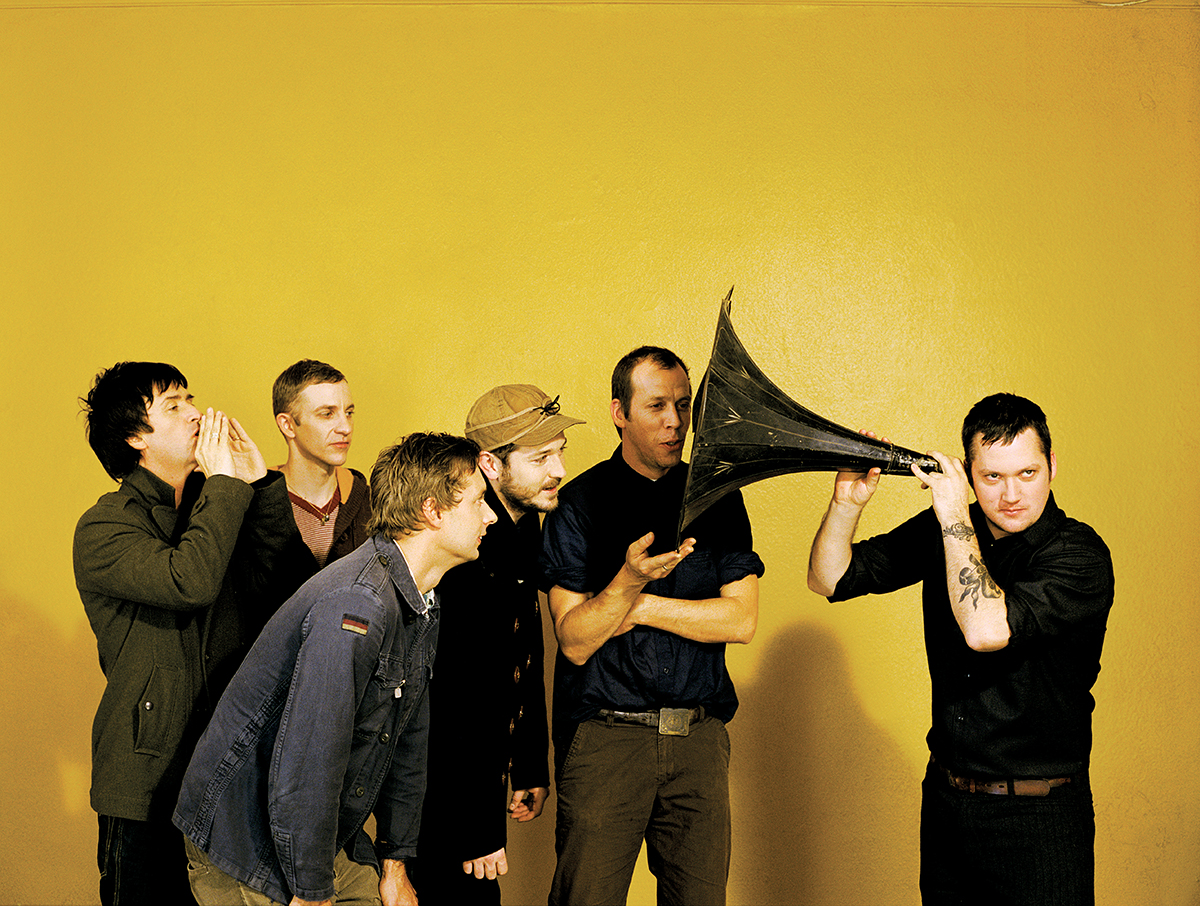
Ever the keen collaborator, Marr retains hopes of working again with The The leader Matt Johnson, who he has known since they were teenagers. Since Marr played on Dusk in 1993, the only new The The album has been 2000’s NakedSelf. “I’m on at Matt all the time to make a new record,” Marr laughs. “I saw Matt a couple of weeks ago, and he played me two new The The songs. They were really great, but I couldn’t hear myself being able to play on them. The songs didn’t need me. But I’m sure Matt and I will work on something again one day.”
Marr also speaks fondly of his time with Portland, Oregon indie stars Modest Mouse, recalling: “The most artistic situation I’ve ever been in. Modest Mouse was a creative artistic endeavour – you’ve only got to look at their sleeves and videos to see that.”
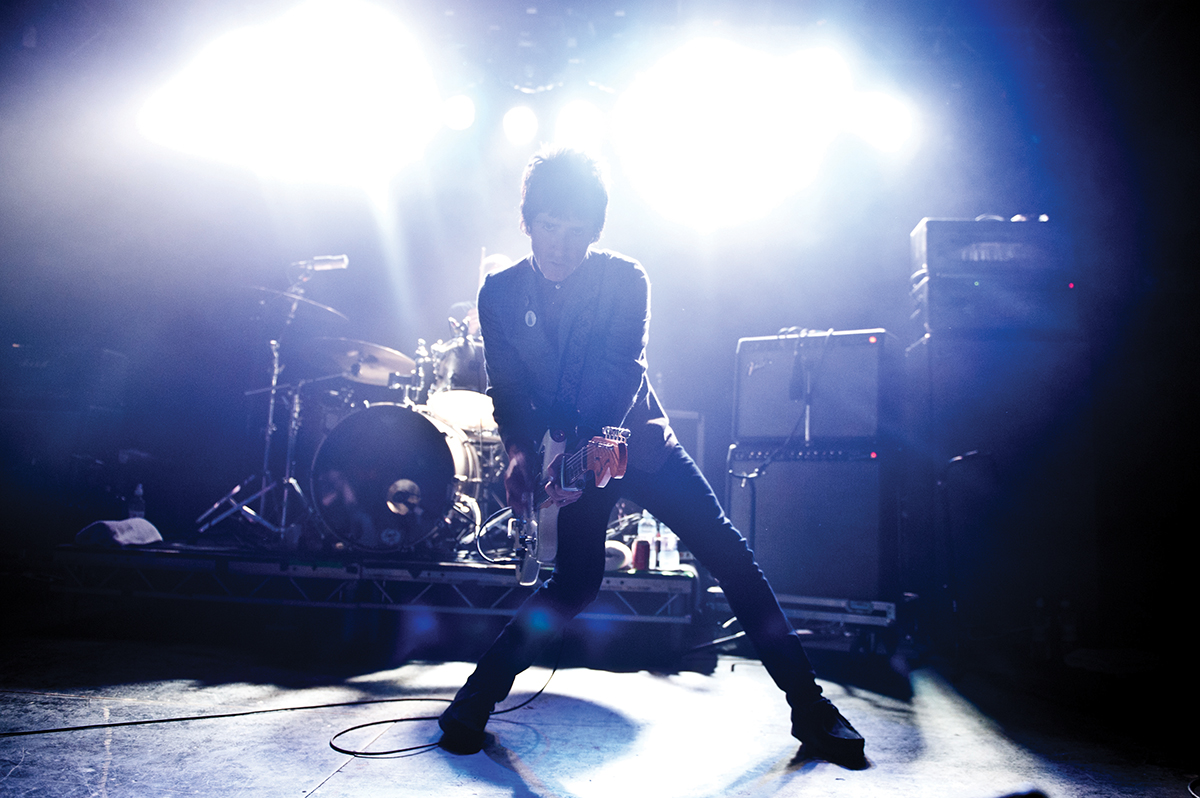
Marr on the opening night of his solo tour in Oxford in 2013
Focusing on his next solo album, Marr talks excitedly of “jumping off somewhere else”, having viewed his first two records as a thematic pair, and he believes he has “a couple more books in me”. Johnny Marr, it’s clear, loves a challenge. He gave up meat when Morrissey decided The Smiths’ second album should be called Meat Is Murder.
He gave up drinking in 2003. He now runs 10 miles a day. “When I was 12, I took on smoking cigs and looking like Johnny Thunders with great gusto, and I ended up quitting them in the same fashion 30 years later,” he says. “I’m all or nothing, and happy to be that way. It’s too late to change. You know how you are by now, or you should. I was full-on when I quit smoking, but I was also that way when I discovered acid. I take things to the limit.”
What’s kept Marr moving through all of his musical adventures is restlessness: “I always deep down have a sense of being my own entity,” he says. “I think that took a long time for the outside world to find out. Guitarists aren’t supposed to be my way.”
